Majority of Stavropol residents give negative assessment of work of Stavropolsky Region's governorResults of a survey of residents of Stavropol carried out by the "Caucasus Times" agency.
(Caucasus Times) - From January 18 to 25, 2006, the Caucasus Times carried out a lightning survey of residents of the South Russian city of Stavropol. The age of respondents was from 16 to 65 years.
The results of the survey showed that a majority of residents who took part in the survey gave a very critical assessment of the work of Alexander Chernogorov in the post of Head of Administration of the Stavropolsky Region. Thus, 28% of respondents took a negative view of Chernogorov's work, while 23% took a rather negative view. Only 11% gave a positive assessment amd 21% gave a rather positive one. In spite of the fact that Chernogorov has occupied the post for a lengthy period of time, a very significant number of those canvassed (17%) found it difficult to give any assessment of his work.
An overwhelming majority of those canvassed (88%) consider that social and economic problems (unemployment, low wages) are the most acute problems of the Stavropolsky Region. The second most urgent problems (67%) were named as those of personal safety (criminality, terrorism), and inter-ethnic relations came third (12%). 10% of respondents mentioned other problems as being among the most acute, most frequently indicating in this connection the low quality and deficiencies in government (bureaucratism, bribery, unprofessional behaviour, price increases, problems with the ZhKKh [municipal housing services management], etc.). 4% think that the territory’s most urgent problems lie in the religious sphere.
The distribution of answers repeats to a marked extent the results of analogous surveys in the national republics of the North Caucasus, attesting to the fact that social and economic problems are a priority for the overwhelming majority of the population of Southern Russia. At the same time, the number of those who mentioned problems of personal safety as a priority in relatively stable Stavropol (67%) is higher than the analogous index for Ingushetia (53%), considerably exceeding a similar index in some relatively stable republics of the North Caucasus. Thus, during an analogous survey carried out in the republic of Adygeya during April 2005, only 28% of Maikop residents put problems of personal safety in the most important category. This testifies to the fact that the majority of Stavropol residents are seriously perturbed by the problems of safety, obviously in the light of recent events in other parts of the Northern Caucasus, above all in Nalchik, Kabardino-Balkaria.
The answers to the question "are you ready to participate in anti-government actions in the case of an increase in your dissatisfaction with the policy of the authorities?" demonstrated that 12% of those interrogated are prepared to take part in such actions and 18% are "rather prepared". A similar result was also obtained during surveys in the national republics of the North Caucasus, which is a very alarming signal for the local authorities. Nevertheless, the majority of those interrogated in Stavropol not is inclined to participate in anti-government actions - 29% answered “no” to this question, and an equal number - "probably not". A rather large number of participants in the survey - 12% - had difficulty in answering this question.
In response to the question about how the overall situation in the Stavropolsky Region may change in the near future, the overwhelming majority of those asked showed expectations of restrained pessimism. Thus, 51% of respondents think that the situation will not change substantially, while 30% are convinced that it will deteriorate. Only 13% of respondents were optimistic, stating that the situation will improve. 6% of those asked found it difficult to answer this question.
The majority of participants in the survey are very critically disposed with regard to Moscow’s initiative on the abolition of the election of regional heads, and their appointment from the centre. Thus, 31% think that this will lead to new problems, while 15% consider that it will only aggravate the existing problems. At the same time, about a quarter of those asked (24%) expressed confidence in the fact that this measure is stabilizing the situation in the Stavropolsky Region, which most probably bears witness less to the confidence of the respondents in the policy of the centre, than to their distrust of the local authorities.
Although the practice of the abolition of elected regional heads and their appointment directly from the Kremlin has already been in effect for quite a long time, a substantial part of the population, is still not sure of its attitude to this innovation by the federal centre. Almost a third of those canvassed (30%) found it difficult to give an answer to the question about the possible consequences of this innovation.
* * *
For the overwhelming majority of respondents (83%), television was the main source of information about current events, slightly ahead of radio, in second place (32%). Newspapers keep an important place as sources of information (23%), as also does contact with the friends and relatives (23%). 7% indicated the Internet as their basic information source, and 6% - international television. Only 1% of those asked named international radio as their primary source of information.
Note: This survey was conducted within the framework of a 12-month study project called "Public Opinion in the North Caucasus", which is being carried out in all the North-Caucasian republics with the financial support of the American foundation NED. The distribution of replies to the questions of the survey is given in percentages. Two versions of a reply were allowed for some of the questions.
Charts (answers are in percentages):
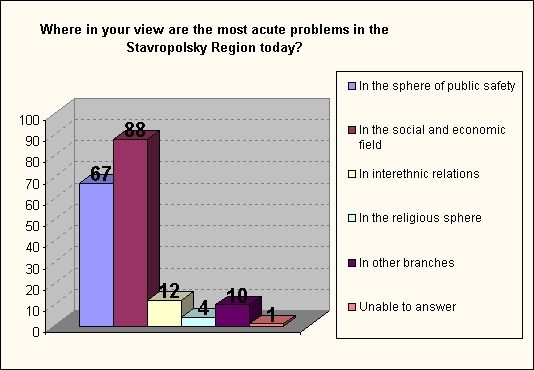
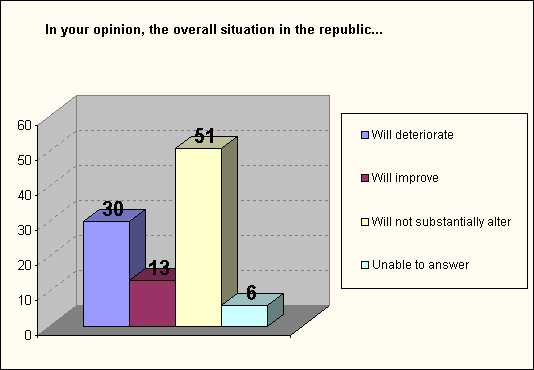
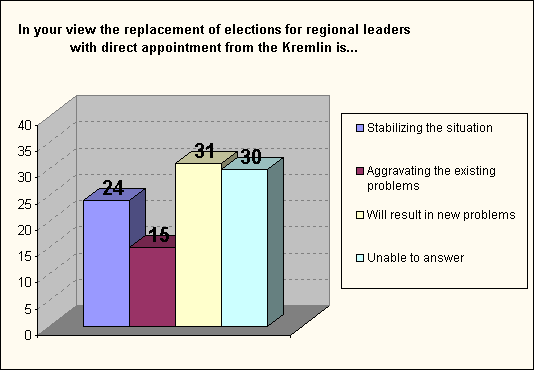
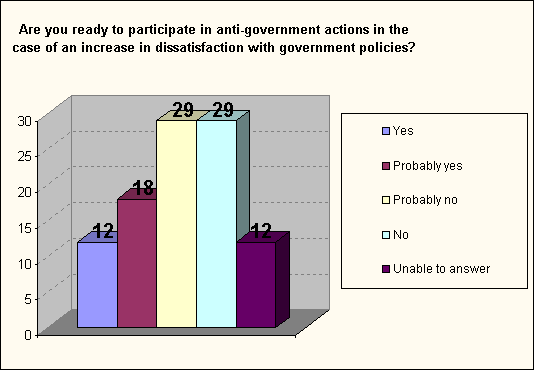
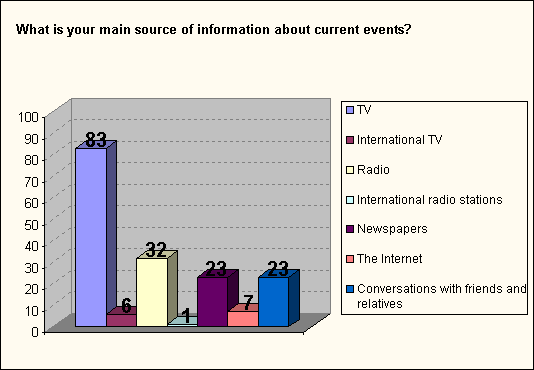
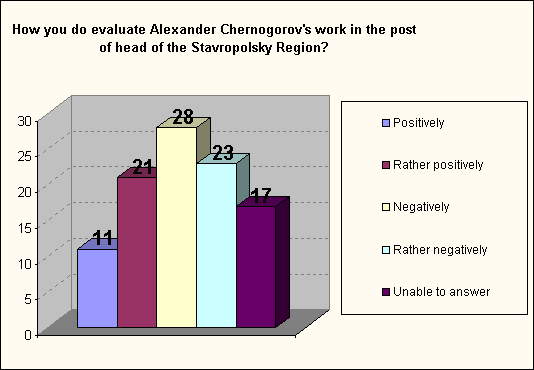
Translated by David McDuff.
(MD/T,B)
DISCUSSION FORUM
|

